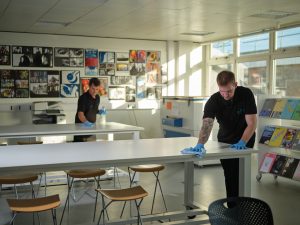New cleaning contractor? No problem. Nviro and the mobilisation process
01 April 2023 Category: Company News Educational Establishments Schools, Academies and Trusts Uncategorised
Changing hands after a procurement process can be a daunting business for many clients. The tender process can be long and expensive. Finances have to be validated to external stakeholders. Unexpected challenges can arise from any direction. But with the right cleaning partner, it doesn’t have to be overwhelming.
First let’s get honest about the challenges of mobilisation
There will be challenges when switching providers, and anyone who promises a seamless changeover is lying. The key isn’t to look for a cleaning team that hides this possibility, it’s to look for a team that has faced all possible challenges before and knows how to respond.
We’ve encountered all sorts of circumstances in our 30 years of experience. For one mobilisation, the previous contractors hadn’t informed the foreign nationals in their cleaning teams – who were unfamiliar with UK legislation – that they were legally entitled to holidays. That meant we inherited a team with 40+ days annual leave in the upcoming year, and this obviously had cost implications and impacted service delivery.
There have been many cases of cleaners using their own chemicals, bought from local supermarkets. And we’ve seen husband and wife teams bring their kids into school, sit them down in a corner, and proceed to clean as a pair – even though only one is listed as an employee.
Some instances defy belief. There was one time a recently ousted cleaning company broke into a storeroom on one of our sites and took all the vacuum cleaners. How? Well, they knew the site and the school hadn’t got around to changing their building codes.
We’re a person-centred company. We don’t sit idle when we find staff working in inhumane or dubious conditions, but there’s another factor at play here: it’s a security risk. What happens when we don’t know which chemicals are on-site or who has access to them? What happens when contractors don’t know who owns which sets of keys, or who has access to which key code?
Confronting the reality of mobilisation challenges is the first step to having realistic goals. But now that we’ve unpacked some of the first step to making the onboarding process as smooth as it can be.
How we remove some of the risk from mobilisation
At Nviro we’ve been handling changes of the guard for over thirty years, and we’ve designed processes to smooth out the transition with minimal difficulty.
Here at Nviro, we have a robust process for making sure we mobilise effectively.
1) Preparing for implementation
Defining the scope and specification of the work, laying out realistic goals and being honest about the challenges means we can de-risk the process when working towards milestones.
In the heat of a tender presentation, providers often over-promise when it comes to mobilisation. Sometimes a service provider will simplify the process and your procurement and finance specialists might not know enough detail to question them. And if you haven’t surveyed the sites to know which targets are realistic, you’re going to have to work from estimates which might be out of date.
We perform thorough site visits and we do them early
Working from data is useful, but only if it’s reliable. Sites evolve over time. New structures are built, old rooms are reconfigured or upgraded, and as natural changes occur in the development of a site, off-site data from many years ago may no longer reflect reality.
A site visit can weed out errors in data, such as, “That vinyl floor is listed as carpet”, “This kitchen is listed as an office area.” Site visits mean we can rectify solutions that look good on paper before they become problems.
This process also means that as we develop a plan for implementing your cleaning contract, we can scope and fulfil equipment and supply needs in an efficient and cost-effective way.
We work closely with building users
Site visits have another use: validating the timings of contract with building users.
As an example, January 1st may seem like a great time to start a contract for a procurement team. But many staff, including the cleaning team will take this time as annual leave to be with their families and loved ones, and suppliers will need to deliver stores and machinery. It’s also likely that most of the management team are going to be on holiday – or certainly not want their holiday plans disrupted when someone can’t get access to a building. So why start a contract at this time?
We’ll also quickly learn what suppliers need access to the site, so we can organise effective delivery times.
2) Outreach and onboarding
Often, in mobilisation situations, the team get TUPE’d across and that’s it. Management changes, but little else. We do things differently.
We take care of our team
People stay at the forefront of our service, and that means that the people we work with – on all levels – feel valued across the changeover.
With one recent contract, the previous employer hadn’t given the cleaning teams any notice about upcoming changes. So our first action was to start with outreach to staff. We sent them text messages to tell them that their employer had changed, and arranged visits, one-to-ones, and roadshows. All of this means we can onboard them properly, get to meet them and welcome them to our organisation.
We provide thorough quality assurance
Getting to know the team does more than iron out the creases in a changeover. Yes, part of this process is to ensure everyone gets their uniforms, gets paid what they are expecting, and so on, but it has a second purpose.
Spending time on site means we can spotlight the challenges we spoke about earlier. If bad habits have crept in, we rectify them. If KPIs have slipped, we create a new norm. If only minor changes are needed, we course-correct gently in the right direction. But we’re not afraid to manage poor performance, particularly when it’s been brushed under the carpet in anticipation of a shift.
3) Laying a foundation for long term success
A robust onboarding process is about more than the immediate impacts of a switch, it’s also about setting processes and systems in place to ensure we mobilise effectively over the months and years to come.
We create efficient lines of communication
We’re practised at going beyond the information we’re given so we can improve lines of communication between building users and cleaning teams.
For instance, you might give us a list of Facility Managers to talk to for a site. But as we communicate directly with those teams, we can grow that list so it includes others responsible for certain buildings or aspects of management, and potentially more building occupants. This means we can be more efficient in our communication.
We prepare to stay agile
To create long term success, we need to stay in the loop with all stakeholders. From experience we know it’s not good enough to look at a static set of targets, and expect certain results by a certain date, we need to keep the conversation open.
The reality is that mobilising a new team is about staying agile, able to reassess plans as needs arise. We need crisis management team contacts in place, and we need to be able to liaise with you along the way.
We evaluate and adjust
We create points in time where we reflect on KPIs and NPS performance, consider where we wanted to be in the length of a contract, and reassess the next move.
This involves looking at specific milestones that we’d like to reach, with a focus on outcomes rather than hours, so we can create a clean, hygienic and safe environments.
That’s our approach, and it works. Many of those contract holders have stayed with us for over 20 years as satisfied clients. Regardless of the size of the project, with Nviro you can rest assured that whatever it is, we’ve done it before, we’ve seen the challenges before, and we know how to make the changeover process a smooth one.


